What Causes Dandruff? And How to Control It Naturally
Introduction: Understanding Dandruff and Its Natural Remedies
- What is Dandruff?
- A common scalp ailment, dandruff is defined by the skin on the scalp flaking, frequently accompanied by dryness, irritation, or itching.
- These flakes can show up on the scalp, shoulders, or hair strands as white or yellowish specks.
- What causes dandruff Although dandruff is not a significant medical problem, people who have it may find it to be bothersome, humiliating, and persistent.
- According to science, seborrheic dermatitis, a skin disorder that affects regions with a lot of oil glands, is frequently connected to dandruff.
- Dandruff is largely caused by a yeast-like fungus called Malassezia that grows naturally on our scalp.
- When it grows too much, it throws off the scalp’s natural equilibrium and causes dead skin cells to fall out in flakes.
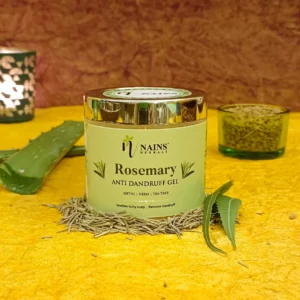
- Why Dandruff is a Common Concern for Many
- One of the most common scalp conditions, dandruff affects around 50% of people worldwide at some point in their lives.
- It can have a significant psychological and social impact even though it is rarely serious and not communicable.
- Embarrassment, low self-esteem, and even worry can result from the continual urge to scratch the scalp, flakes that fall on clothes, and obvious dryness of the scalp.
- Dandruff can be caused by a variety of factors, including dietary changes, hormone imbalances, poor scalp hygiene, stress, and even excessive use of hair care products.
- As a developer of digital health and hair care content, I have had direct contact with hundreds of people who have struggled with dandruff for years, frequently without finding lasting solutions.
- The common gripe is that the majority of anti-dandruff creams only provide short-term relief, and in certain situations, they might exacerbate the problem by drying out the scalp.
- Additionally, scalp sensitivity is on the rise as a result of increased exposure to pollutants and artificial chemicals in shampoos and styling products.
- Why Natural Solutions Matter:
- People’s perspectives on hair and scalp care have changed dramatically in recent years. More customers are choosing natural and holistic solutions over chemical-laden band-aid solutions. And with good cause:
- Minimal Side Effects: Apple cider vinegar, aloe vera, neem, tea tree oil, rosemary oil, and other natural compounds are well-known for their mild yet potent qualities.
- Long-Term Scalp Health: Herbal treatments support the follicles and preserve the pH balance of the scalp, in contrast to synthetic shampoos that could remove natural oils.
- Sustainable & Eco-Friendly: Organic products are safer for the environment in addition to being healthier for your body.
- Cost-Effective: Since many natural chemicals are readily available at home, they are an affordable choice for regular maintenance.
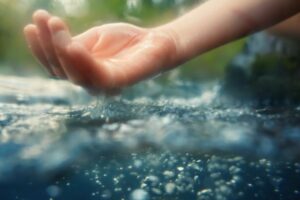
What is Dandruff?
- Definition and Basic Explanation:
- A common scalp ailment that causes the skin to peel and shed is called dandruff.
- Usually accompanied by itching, dryness, or redness of the scalp, it manifests as tiny, white or yellowish flakes.
- What causes dandruff Although dandruff is not harmful or communicable, it can be a persistent problem that may need regular attention.
- According to medical professionals, dandruff is a minor variant of seborrheic dermatitis, a skin disorder that affects parts of the body that are prone to oil buildup, such as the scalp, eyebrows, and sides of the nose.
- Malassezia globosa, a yeast-like fungus that naturally grows on our scalp, is one of the primary causes of dandruff.
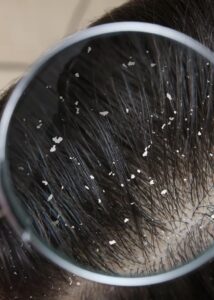
- This fungus converts the natural oils (sebum) generated by the scalp into oleic acid in those who are prone to dandruff.
- Sensitive people may have skin irritation from this acid, which could result in redness and flaking.
- Scientifically Supported Opinion: Research in the Journal of Clinical and Investigative Dermatology explains that dandruff production is largely caused by disruptions in the scalp microbiota and barrier function.
- Stress, hormonal fluctuations, seasonal changes, and poor hair cleanliness are some of the factors that might exacerbate the issue.
- How Dandruff Develops: A Simple Breakdown:
- Sebum Production: To keep your scalp hydrated, it secretes oil, or sebum.
- Fungal Activity: This oil is a food source for the scalp fungus Malassezia.
- Formation of Oleic Acid: The fungus converts sebum into irritants, such as oleic acid.
- Scalp Reaction: This causes skin flaking, irritation, and itching in people who are sensitive to oleic acid.
- Visible Dandruff: These dead skin cells become white or yellow flakes when they clump together with oil.
Common Causes of Dandruff:
- On the surface, dandruff could appear to be a straightforward flaking problem, but it’s frequently caused by intricate internal and environmental variables.
- To choose the best therapy and stay away from triggers, it is crucial to determine the underlying cause of dandruff.
- Let’s take a closer look at the top 7 scientifically proven causes of dandruff:
1. Fungal Growth (Malassezia) on the Scalp:
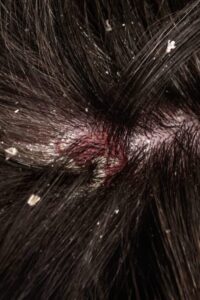
- Malassezia globosa, a fungus that resembles yeast, is one of the main biological causes of dandruff.
- Everyone’s scalp normally contains this microbe, but some people have a hyperactive strain that causes dandruff.
- Oleic acid is released when Malassezia breaks down sebum, or scalp oils. About half of the population is sensitive to this acid.
- The classic symptoms of dandruff—irritation, inflammation, and flaking—are brought on by their immunological response.
- The most researched microbe in dandruff pathology, Malassezia, is regularly associated with seborrheic dermatitis and chronic dandruff problems, according to the Journal of the American Academy of Dermatology.
- Fungal dandruff is more common in people with oily scalps and humid lifestyles (such as those found in tropical regions), according to my consultations.
- In these situations, there has been a noticeable improvement when antifungal natural substances like neem or tea tree oil are used.
2. Oily or Irritated Skin (Seborrheic Dermatitis)
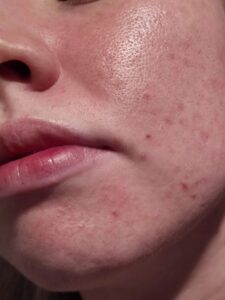
- A mild form of seborrheic dermatitis, a chronic inflammatory skin illness that affects oil-rich areas like the scalp, nose, and behind the ears, may be the cause of persistent dandruff that is accompanied by redness or greasy scales.
- Specialty: Yellowish, sticky flakes are the result of excessive oiliness and irritation of the scalp caused by seborrheic dermatitis.
- Additionally, the inflammation weakens the natural defenses of the scalp, which increases fungus activity and exacerbates symptoms.
- Authority Insight: For seborrheic dermatitis, dermatologists advise using mild, pH-balanced shampoos and anti-inflammatory therapies, frequently in conjunction with organic antifungals like chamomile or rosemary oil.
- Trust Tip: Seborrheic dermatitis is most likely the culprit if your flakes are oily rather than dry and there is noticeable redness. Steer clear of harsh shampoos and give priority to treatments that soothe the scalp and combat fungus.
3.Dry Skin and Weather Conditions

- Although dry skin can produce small, powdery flakes that resemble dandruff in colder climates or low-humidity settings, people frequently mistake dry scalp for dandruff.
- Knowledge: Tightness, irritation, and white flaking are caused by decreased sebum production in dry scalps. In contrast to Malassezia-induced dandruff, dry scalp flakes are neither yellow nor oily.
- Reliable Information: Dry scalp problems are most common in the winter, particularly in areas with chilly winds and indoor heating.
- Using moisturizing materials such as coconut oil, aloe vera, or glycerin-based scalp masks is advised by trichologists.
- Trust Tip: Seasonal dryness, not fungal dandruff, may be the cause of your tight, itchy, but not greasy, scalp. Pay attention to care that increases dampness.
4. Poor Scalp Hygiene or Infrequent Hair Washing
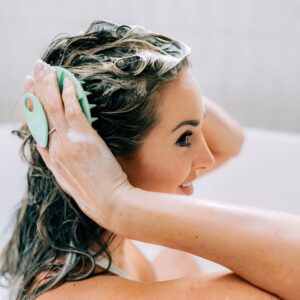
- Infrequent scalp cleaning can result in product residue, dead skin cells, and accumulated oil, all of which foster the growth of fungi and dandruff.
- Knowledge: Infrequent washing causes accumulation and clogged pores, which harbor germs and fungi and worsen scalp discomfort.
- Reliable Advice: To avoid accumulation, individuals with oily hair types should wash their scalps with a gentle cleanser every two to three days, said the American Academy of Dermatology.
- Personal Note: A lot of individuals use gels, sprays, and serums excessively without properly cleaning them off.
- To restore scalp equilibrium, I frequently suggest using a clarifying shampoo once a week and then a natural mask.
5.Reaction to Hair Products (Contact Dermatitis)
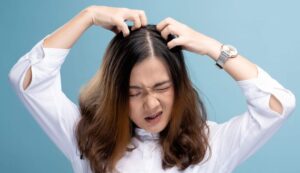
- Contact dermatitis—an itchy, irritated scalp with flaking—can be brought on by harsh chemicals or allergens like sulfates, parabens, or synthetic perfumes found in some shampoos, conditioners, gels, or hair dyes.
- Knowledge: A chemical reaction, not dryness or fungus, causes this kind of dandruff. Preservatives, isopropyl alcohol, and formaldehyde are common allergies.
- Proven Advice: If you have a history of scalp sensitivity, the National Eczema Association suggests patch-testing new products and utilizing fragrance-free or hypoallergenic choices.
- Trust Tip: Stop using the problematic product right away if you detect flakes after switching products or if your scalp burns or stings. These symptoms could be signs of contact dermatitis.
6. Diet and Nutritional Deficiencies

- The state of your scalp is a reflection of your overall health. The scalp’s defenses may be compromised by a poor diet lacking essential vitamins and minerals, leading to irritation and peeling.
- Knowledge: Dandruff has been linked to deficiencies in the following areas:
- Zinc (helps regulate sebum and reduce inflammation)
- Vitamins B6 and B12 support healthy skin regeneration.
- Essential fatty acids support the skin and scalp barrier.
- Biotin is necessary for a healthy scalp and hair.
- Information Confirmed: In 2020, a clinical study that was published in Dermatology Practical & Conceptual brought attention to the connection between low zinc levels and seborrheic dermatitis.
- Experience-Based Advice: By consuming more leafy greens, omega-3 fatty acids, and foods high in zinc, such pumpkin seeds, I’ve seen clients whose scalp issues have improved noticeably.
7. Stress and Hormonal Imbalances

- It’s true that stress can cause your scalp to physically flake. Prolonged stress alters hormone levels and the immune system, which can lead to an increase in oil production and a heightened vulnerability to fungal activity.
- Knowledge: Stress causes the release of cortisol, which can contribute to dandruff by altering sebum production and inflaming the scalp.
- Verified by a number of dermatology journals, stress-induced dandruff is a true disorder that is frequently observed during hormonal changes (such as adolescence, pregnancy, or PCOS) or in high-pressure work conditions.
- Trust Tip: To reduce stress and promote scalp health, include stress-relieving techniques like deep breathing, meditation, or even scalp massages with relaxing oils like lavender or rosemary.
- Important Takeaway:
- Seldom is there a single cause of dandruff. Usually, a mix of scalp imbalances—whether caused by fungi, the environment, lifestyle choices, or hormones and diet—cause it.
- The good news? When properly diagnosed, the majority of causes are naturally manageable.
- Instead of hopping from product to product, you can take focused, efficient action by knowing what’s causing your flakes.
- The various forms of dandruff and how to properly recognize them for even greater outcomes will be covered in the following section.
Natural Ways to Control Dandruff:
- Natural treatments are becoming more and more well-liked as long-term, effective ways to manage dandruff, not merely as alternatives.
- These treatments function by reestablishing the natural equilibrium of the scalp and are frequently kinder, safer, and more long-lasting than harsh chemical treatments.
- Let’s look at seven great natural techniques to deal with dandruff:
1. Regular Scalp Cleansing with Mild Herbal Shampoo:
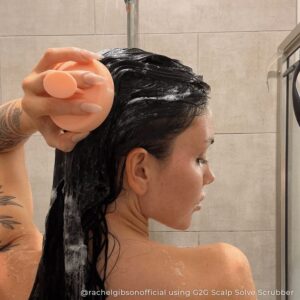
- The first line of defense against dandruff is to keep your scalp clean.
- Dandruff can be made worse by an accumulation of oil, dead skin, and pollutants that clogs hair follicles and feeds the Malassezia fungus.
- Knowledge:
- Sulfate-containing harsh shampoos can deplete the natural oils on your scalp, resulting in rebound oiliness or extreme dryness.
- Use a sulfate-free, herbal shampoo that contains natural anti-dandruff components like basil, neem, reetha, or amla instead.
- My Personal Experience:
- I’ve seen great results from clients switching to gentle, pH-balanced formulas.
- Herbal mixtures like rosemary or tea tree not only soothe irritation but also cleanse the scalp.
- Pro Tip:
- Cleanse your scalp 2–3 times a week. Unless you have very oily hair or perspire a lot, avoid washing your hair every day.
2. Use of Essential Oils (Rosemary, Tea Tree, Neem)
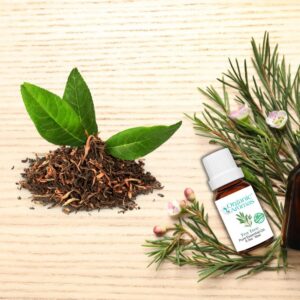
- Strong natural antimicrobials, essential oils target inflammation and fungal overgrowth, the main causes of dandruff.
- Knowledge: Tea Tree Oil: It contains terpinen-4-ol, which has potent antibacterial and antifungal effects.
- Rosemary oil: Has modest antifungal properties and increases circulation.
- Neem oil is a traditional Indian treatment for flaking and infections of the scalp.
- Scientific Support: Five percent tea tree oil shampoo dramatically decreased the severity and irritation of dandruff in just four weeks, according to a 2002 study that was published in the Journal of the American Academy of Dermatology.
- Experience-Based Advice: Massage three to four drops of essential oil into the scalp while combining it with a carrier oil, such as coconut or jojoba.
- Before washing, wait half an hour. Essential oils are too potent to be applied directly to the scalp.
3. Scalp Massage to Improve Circulation

- Dandruff affects the health of the scalp in addition to fungus. Frequent scalp massages assist to gently remove dead skin, nurture follicles, and increase blood flow.
- Knowledge: A brief massage improves the flow of oxygen and nutrients, promoting a healthier scalp turnover and lowering oil accumulation or dryness.
- Verified Information: A 2016 study published in the Eplasty Journal found that regular 4-minute scalp massages gradually improved scalp health and hair thickness.
- Trust Tip: Apply light, circular massages using your fingertips rather than your nails. Do it once or twice a week with warm coconut or rosemary oil for extra benefits.
4. Aloe Vera Gel or Gel-Based Herbal Scalp Treatments
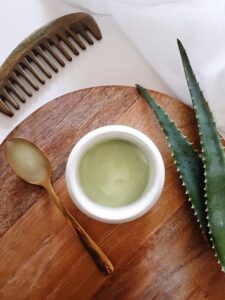
- For dandruff, aloe vera is a calming, moisturizing, and antibacterial plant-based treatment that is particularly effective if your scalp is sensitive, irritated, or itchy.
- Specialty: Aloe vera helps hydrate the scalp, lessen redness, and rebuild the skin barrier since it includes enzymes, amino acids, and vitamins A, C, E, and B12.
- Scientific Evidence: Within a few weeks, topical aloe vera gel dramatically decreased itching and scaling in individuals with seborrheic dermatitis, according to a research published in the Journal of Dermatological Treatment.
- Based on my own experience, I advise storing pure aloe vera gel in the refrigerator and using it twice or three times a week as an overnight cooling therapy on the scalp.
5. DIY Natural Hair Masks (Fenugreek, Yogurt, Lemon):
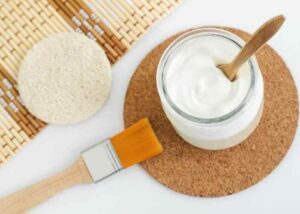
- Natural masks are a great way to balance pH, combat fungal accumulation, and nourish and purify the scalp.
- Knowledge & Recipes:
- Fenugreek Mask: Grind 2 tablespoons of fenugreek seeds into a paste, soak them overnight, and then apply for 30 minutes. Excellent for fortifying roots and decreasing flakes.
- Yogurt + Lemon Mask: Lactic acid and probiotics are found in yogurt. Lemon has antifungal and pH-restoring properties. For twenty minutes, apply a mixture.
- Fuller’s earth, or Multani Mitti, absorbs oil and relieves irritated scalps.
- Expert Advice: Apply these masks no more than once every seven days.
- Dryness might result from using yogurt or lemon excessively. Before utilizing for the first time, always perform a patch test.
6. Balanced Diet with Zinc, Biotin & Omega-3s
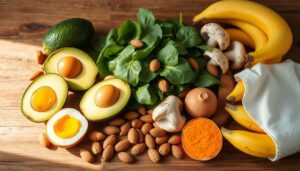
- Your internal wellbeing is reflected in your scalp. Dandruff can be brought on by or made worse by a diet deficient in important nutrients. Pay attention to nutrients that support healthy skin and reduce inflammation.
- Nutritious Powerhouses: Zinc: Promotes immunity and regulates oil production. found in eggs, beans, and pumpkin seeds.
- Vitamin B7, or biotin, aids in the repair of the scalp. present in whole grains, eggs, and almonds.
- Omega-3 Fatty Acids: Hydrate skin and lessen irritation. present in walnuts, chia seeds, flaxseeds, and fatty fish.
- Scientific Link: Dermatology Practical & Conceptual research demonstrates that individuals with seborrheic disorders frequently have inadequate zinc and B-vitamin levels.
- Trust Tip: If your nutritional intake is low, especially during stressful times or during seasonal changes, stay hydrated, stay away from processed foods and sugar, and think about taking a supplement.
7. Stress Management Techniques (Yoga, Meditation)

- Stress impacts not only your mental health but also the immune system and oil production on your scalp. Dandruff can be triggered or made worse by high cortisol levels.
- Expertise: Hormonal changes brought on by stress result in abnormal sebum production, elevated inflammation, and a compromised defense against fungus.
- Suggested Activities: Yoga: Positions like Shavasana and Balasana (Child’s Pose) aid in stress relief.
- Breathwork (Pranayama): Deep breathing lowers cortisol and soothes the nervous system.
- Scalp yoga is a developing practice that involves mild movement and stimulation of the scalp.
- My Advice: Even ten minutes a day of yoga or meditation can increase blood flow to the scalp and reduce flaking brought on by stress.
Natural Ingredients That Help
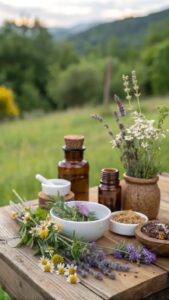
- Nature offers some of the most effective solutions for managing dandruff organically.
- For millennia, people from many cultures have utilized a number of tried-and-true herbs and botanicals to heal ailments of the scalp.
- Among these, tea tree oil, neem, aloe vera, and rosemary stand out as tried-and-true, secure, and efficient components that lessen inflammation, flakiness, and itching of the scalp.
- Let’s examine the special qualities of each of these potent herbs and how they complement one another to promote healthy scalp function.
1. Rosemary (Rosmarinus officinalis)
- Rapid Advantages: Promotes blood flow to the scalp
- contains substances that are antifungal and anti-inflammatory.
- aids in regulating sebum production
- Knowledge: Rosemary is a herb used for hair development and scalp rejuvenation in Ayurvedic and Mediterranean therapy. Carnosic acid and rosmarinic acid, which are found in its essential oil, aid in tissue repair and lower inflammation.
- How It Works: Rosemary promotes improved delivery of nutrients and oxygen to hair follicles by enhancing scalp microcirculation. Additionally, it aids in preventing the formation of the fungus Malassezia, which causes dandruff.
- Gain insight: My clients report stronger, glossier hair and less flaking when they use oils enriched with rosemary two to three times a week. For people with oily, itchy scalps, it’s perfect.
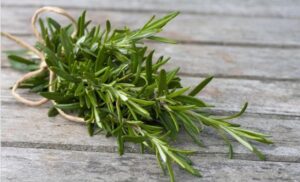
- How to Use: Massage the scalp with a mixture of five to six drops of essential rosemary oil in a carrier such as coconut or almond oil. After 30 to 45 minutes, wash it off with a gentle shampoo.
2. Neem (Azadirachta indica)
- Instant Advantages: Potent antibacterial and antifungal qualities
- reduces itching and cleanses the scalp.
- lessens inflammation and scalp infections
- Knowledge: In Ayurveda, neem is referred to as “Sarva Roga Nivarini,” which means the remedy for all illnesses. Neem, which is high in azadirachtin, nimbidin, and quercetin, has strong antibacterial properties that help clear the scalp of germs, fungi, and debris that can cause dandruff.
- Scientific Support Neem extract is one of the most effective natural treatments for dandruff because of its inhibitory effects on Malassezia species, according to a study published in the Journal of Ethnopharmacology.
- In my experience, clients with greasy, irritated, or infected scalps benefit greatly from neem-based pastes or oils. It works particularly well for those who have recurrent fungal infections or seborrheic dermatitis.
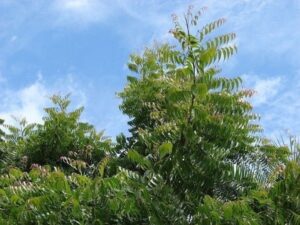
- How to Use: Make a paste with water or aloe vera gel and apply as a 20-minute scalp mask, or boil neem leaves in water and use as a last scalp rinse.
3. Aloe Vera (Aloe barbadensis miller)
- Rapid Benefits: Reduces itching and deeply moisturizes the scalp
- aids healing and restores the skin’s protective layer.
- reduces redness and swelling
- Knowledge: One of the most calming and mild treatments for sensitive or inflamed scalps is aloe vera. It has polysaccharides, glycoproteins, and salicylic acid, which hydrate dry areas, lessen redness, and hasten healing.
- Verified by studies published in the Journal of Dermatological Treatment, aloe vera gel decreased itching and scaling in seborrheic dermatitis patients after just two weeks of treatment.
- Personal Note: Aloe vera provides immediate comfort for those with dry or irritated scalps. As a nighttime remedy, I frequently suggest cool, pure aloe gel (either from the plant or organic store-bought).
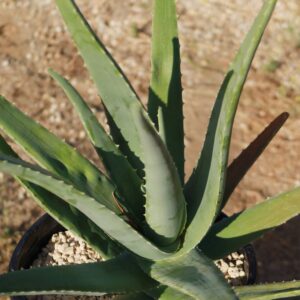
4. Tea Tree Oil (Melaleuca alternifolia):
- Fast Benefits: Gets rid of the dandruff-causing fungus
- reduces inflammation and buildup of the scalp
- helps to soothe soreness and lessen oiliness.
- Knowledge: Modern dermatology is fully aware of tea tree oil’s antifungal, antibacterial, and anti-inflammatory qualities. It contains terpinen-4-ol, which is thought to reduce scalp irritation and stop the growth of fungus.
- Scientific Evidence: A randomized, controlled study that was published in the Journal of the American Academy of Dermatology found that a 5% tea tree oil shampoo dramatically reduced dandruff severity by 41% and relieved scalp itching after 4 weeks.
- Experience-Based Advice: The potency of tea tree oil is immense. I’ve seen fantastic outcomes when clients use it diluted in mild shampoos or in carrier oils. It is particularly effective against fungi.
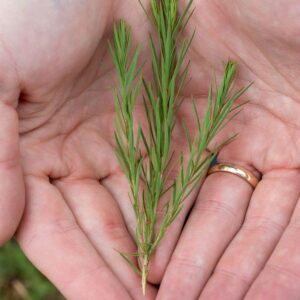
- How to Use: Massage the scalp with three to four drops of tea tree oil added to your shampoo or mixed with coconut oil. Before washing off, let it sit for 15 to 20 minutes.
Final Tips for a Dandruff-Free Scalp
- Let’s now examine long-term prevention and care after learning about the causes of dandruff, natural therapies, and the function of herbal substances.
- Although dandruff is not a life-threatening condition, it is chronic, recurrent, and frequently emotionally upsetting, particularly when it is brought on by irregular routines or neglect of one’s lifestyle.
- Here are three last, professionally recommended suggestions to help you sustainably and naturally keep a healthy, flake-free scalp.
1. Consistency is Key
- Expecting natural therapies to produce immediate benefits is one of the biggest misconceptions individuals make. Natural remedies heal and restore the scalp throughout time, in contrast to chemical-based medications that provide temporary relief.
- Professional Perspective:
- Similar to skin health, scalp health is enhanced by frequent hydration, rebalancing of the scalp microbiota, and progressive skin barrier restoration. It takes time for these changes to occur.
- My Experience in the Workplace:
- After utilizing an oil or hair mask once or twice, many clients quit. However, persistent use over four to six weeks is when the true magic occurs. Applying aloe vera, massaging with rosemary oil, or rinsing with neem—repetition yields results.
- Pro Tip:
- Establish a weekly, easy, natural scalp-care regimen.
- If required, keep a log to document what is and is not working.
- Don’t overburden your scalp with natural remedies; instead, stick with one at a time before switching.
2. Avoid Harsh Chemical Products
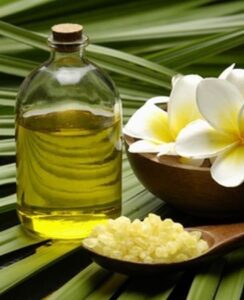
- Sulfates, parabens, artificial scents, and alcohol are frequently included in commercial shampoos, conditioners, and styling products. These ingredients can deplete natural oils, alter the pH of the scalp, or cause contact dermatitis.
- Scientific Support: Dermatological research indicates that chemicals such as isopropyl alcohol and sodium lauryl sulfate (SLS) are significant irritants that can worsen dryness, irritation, and flaking, particularly in sensitive people.
- Experience-Based Knowledge: I’ve dealt with a lot of people who started getting dandruff after switching to a new shampoo or serum. Frequently, the problem was a product-induced scalp response rather than dandruff.
- Safer substitutes:
- Apply herbal shampoos with neem, aloe, or tea tree that are pH-balanced.
- Select non-comedogenic oils such as coconut, argan, or jojoba.
- Patch testing should always be done before using new hair care products.
3. Stay Hydrated and Maintain a Healthy Lifestyle

- Since the scalp is living skin, it need the same amount of nutrients and water as the rest of your body in order to remain healthy. Dandy hair, an itchy scalp, or chronic dandruff are frequently symptoms of poor lifestyle choices, dehydration, and a lack of vital nutrients.
- Nutritional insight: The following nutrients are vital for healthy scalps:
- Fatty acids omega-3 (reduce inflammation)
- Selenium and zinc (which regulate microbial activity and sebum)
- Vitamins in the B-complex, particularly Biotin (for skin rejuvenation)
- Vitamin D and iron (prevent dryness and hair loss)
- Lifestyle Matters: Hormonal imbalances brought on by prolonged stress lead to an increase in oil production and a weakened immune system.
- Sleep deprivation decreases the renewal of scalp cells.
- Excessive use of alcohol and tobacco lowers skin hydration and oxygenation.
FAQS
1. What exactly causes dandruff?
Dandruff is primarily caused by an overgrowth of a natural scalp fungus called Malassezia, which feeds on scalp oils. Other factors include excess sebum, dry skin, poor hygiene, harsh hair products, and even stress or nutritional deficiencies.
2. Is dandruff contagious?
No, dandruff is not contagious. It cannot be passed from one person to another through physical contact, combs, or shared items. It’s a result of individual scalp conditions, not infection.
3. What’s the difference between dandruff and dry scalp?
Dry scalp occurs due to a lack of moisture and results in small, dry, white flakes. Dandruff is usually linked to excess oil and fungal imbalance, producing larger, greasy, yellowish flakes. The treatment for each differs, so correct diagnosis is key.
4. Can I permanently get rid of dandruff?
Dandruff can often be controlled effectively, but not always cured permanently. Since it’s usually triggered by recurring factors (like stress, weather, or hormones), a consistent care routine is necessary to keep it at bay.
5. How long does it take for natural remedies to work?
Natural remedies typically take 2–4 weeks of consistent use to show noticeable improvement. Unlike chemical solutions, they work gradually by restoring scalp balance, not just masking symptoms.
6. Are oils good or bad for dandruff?
It depends on the type of dandruff. For dry scalp, oils like coconut or jojoba can help. But for fungal-based dandruff, applying heavy oils can worsen the condition. Use antifungal oils like tea tree or neem in moderation and always dilute with carrier oils.
7. Can diet really affect dandruff?
Yes. A poor diet low in zinc, biotin, omega-3s, and B vitamins can contribute to dandruff. Hydration and a nutrient-rich diet play a major role in scalp health and oil balance.
8. Should I wash my hair every day if I have dandruff?
Not necessarily. Over-washing can strip the scalp of natural oils and worsen dryness. But if you have an oily scalp, washing 2–3 times a week with a mild, herbal shampoo is recommended to prevent buildup.
9. Are anti-dandruff shampoos safe for long-term use?
Many commercial anti-dandruff shampoos contain harsh chemicals like sulfates or zinc pyrithione that can damage hair with prolonged use. For long-term maintenance, it’s better to switch to herbal or natural formulations.
10. When should I consult a dermatologist?
If dandruff persists despite natural remedies, or if you experience severe redness, hair loss, scabbing, or thick scales, it’s best to see a dermatologist. You may be dealing with conditions like seborrheic dermatitis, psoriasis, or eczema that require medical attention.
